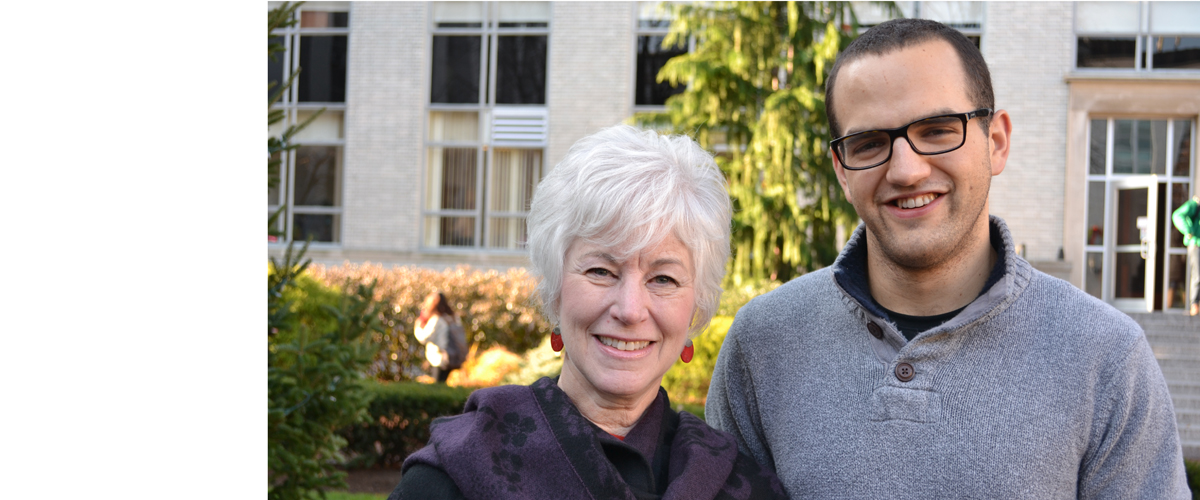by Jessica Driscoll
Mathew Chamberlain, a fifth year senior, chose to attend Northeastern University because of its co-op program, and he’s participated in two exciting opportunities because of it.
“My first co-op was at an on-campus research laboratory – IGERT Nanomedicine Science and Technology Center,” said the physics major from Cape Cod. “I designed an experiment to test superparamagnetic iron oxide nanoparticles for hyperthermic drug release as an alternative to chemotherapy in certain cancers. My data and research was published at the Material Research Society conference in 2010 by Professor Dattatri Nagesha, and my experiment directly contributed to a graduate student’s thesis.”
Chamberlain’s second co-op took place last year at Woods Hole Oceanographic Institution (WHOI).
“I worked under Senior Scientist Rob Evans in the Geology & Geophysics Department,” he said, of his most recent experience. “I traveled to Zambia, Botswana and South Africa with a team of scientists to collect magnetotelluric data along the East African Rift for two months. We drove about 15,000 miles in sub-Saharan Africa in remote regions of Botswana and Zambia.”
Chamberlain said this data will be published in a major research publication on the East African Rift.
Following that co-op, he returned to WHOI and boarded the R/V Wecoma in the Pacific Ocean to deploy ocean bottom seismographs for the Cascadia Initiative to predict the next major earthquake off the west coast of the United States.
Chamberlain said he found these co-ops with the help of his advisor, Karyn Rosen.
“She taught me how to interview, compose a resume, and address the strengths and weaknesses of my application,” he said, adding that he transferred to the physics major in his sophomore year. “She helped me get hired for my first co-op after completing only one semester of physics – a weakness in my application – by saying that I had a unique perspective as a once-criminal justice major. In the last three years, I have exchanged 280 e-mails with Karyn. I trust her because she is focused, professional and gives honest advice.”
*
Rosen has been a member of the co-op faculty at Northeastern for three years. She originally worked with math and physics undergraduates, but now advises computer science majors and graduate students.
“In support of the students, my primary role is that of teacher, career counselor, coach, and co-op job seeker on their behalf,” said Rosen. “The variety that the job brings makes my work incredibly interesting and rewarding. One day I may be helping a student decide between multiple co-op job offers, and the next I’m working with a student who is struggling to get his or her first interview. Having worked in a variety of corporate environments for the majority of my professional life, I fully understand the stress and uncertainty that comes with job hunting. I try to alleviate that for the students. It’s also quite amazing to see how students grow personally and professionally throughout their co-op experiences. They frequently return with a newfound maturity.”
In Chamberlain’s case, Rosen said she realized his passion for his new major when he said he was curious about the “physics of a blood splatter.”
Though they encountered a few challenges at first, they persevered. Rosen said Chamberlain’s case is a perfect example of what makes her job fun.
“He did not allow a closed door to stop his progress,” she said. “And we worked as a team to rehearse for interviews and find him fulfilling opportunities.”
Rosen said the benefits of the co-op program can’t be over-emphasized. “For most, co-op helps students learn about work they like and, as importantly, learn about work they don’t like. With the opportunity to complete up to three six-month co-op work experiences, students can graduate with 18 months of professional work experience. Certainly this helps them be competitive when applying to jobs or graduate schools.”
*
Chamberlain – who is currently applying for a doctorate in physics and recently received an informal job offer at WHOI – considers Rosen a major source of support.
“The position at WHOI received 29 applicants, and I was one of three hired,” he said. “After I had a rough interview at Harvard Medical School for a co-op position, Karyn helped guide me forward to new opportunities. She recently nominated me for the Paul M. Pratt Award for professional growth as a result of my co-op experiences.”
Chamberlain said the co-op advisors play the role of a career counselor for co-ops—helping students develop into young professionals while teaching a life lesson in integrity.

